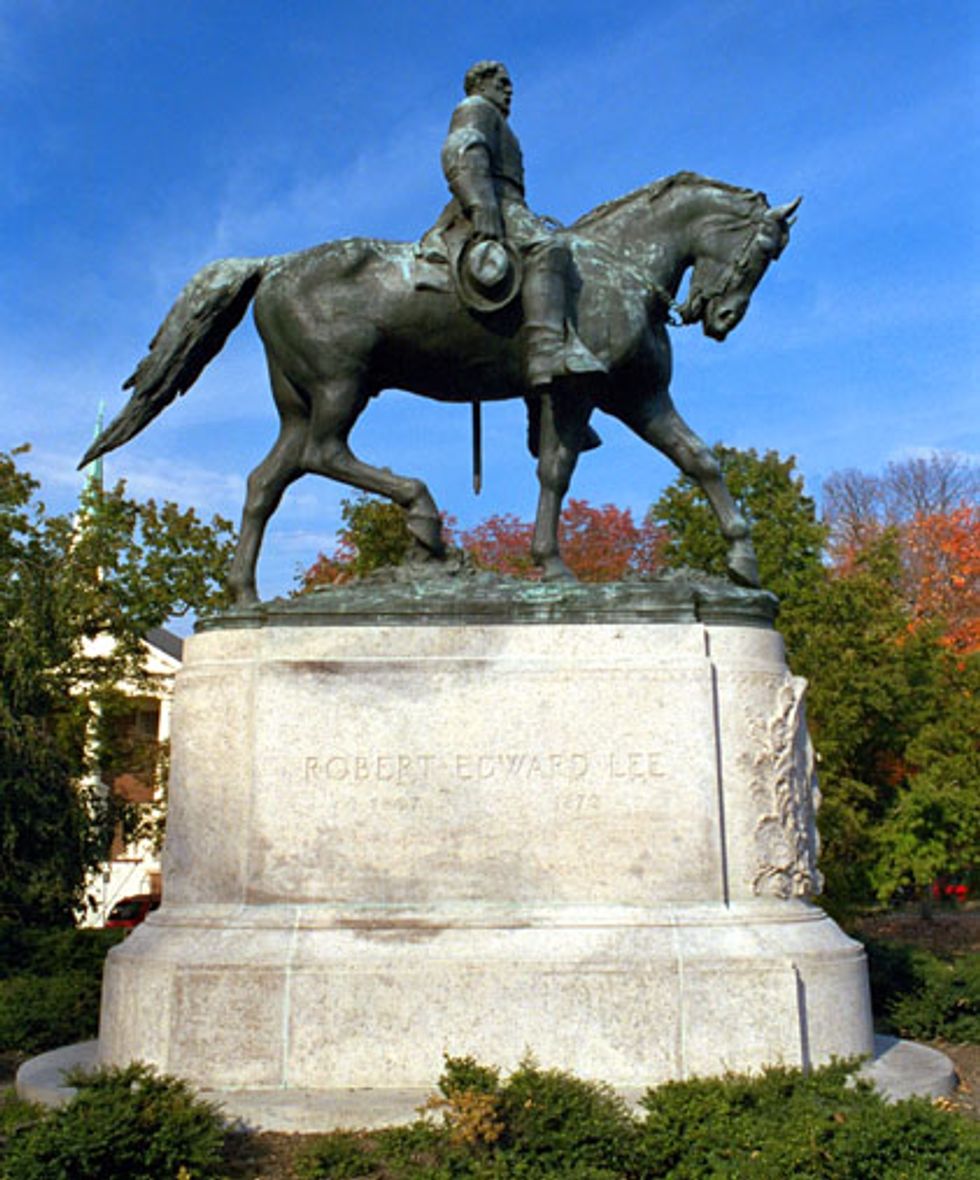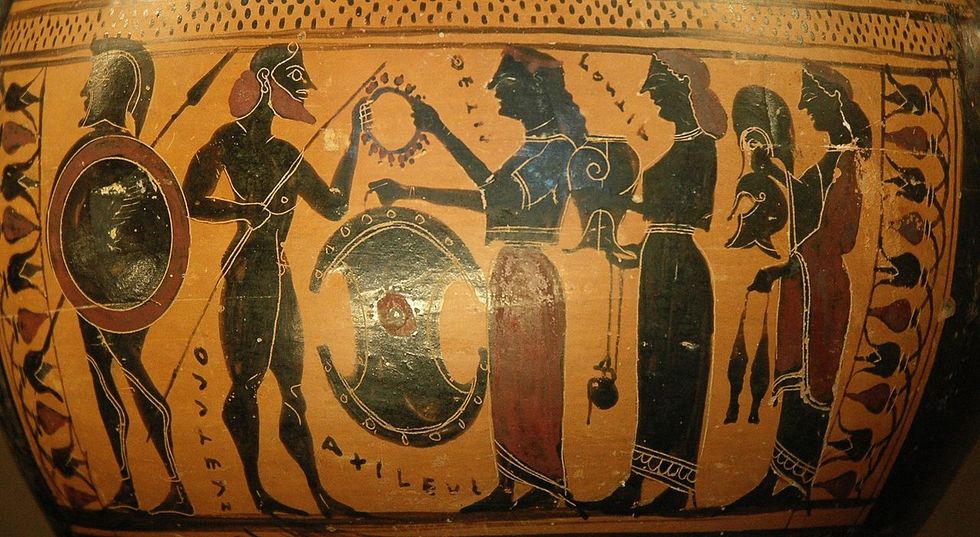On Saturday, August the 12th, a large group of individuals gathered to protest the removal of a statue of Confederate General Robert E. Lee from Emancipation Park in Charlottesville, Virginia. The park, whose land was donated to the city by Paul Goodloe McIntire in 1917, was known as Lee Park until several months ago, when it was changed to "Emancipation Park." In February, the Charlottesville City Council voted 3-2 in favor of moving the equestrian statue of Confederate General Lee and his horse Traveller, the focal point of the park, to a new location.
The decision to displace the statue has been met with controversy on several levels, some of them deeply-rooted in white supremacy. Others have voiced concerns which are, at the very least, less apparently racist. In an email to The Washington Post, Kathleen M. Galvin, an architect and member of the City Council who voted against moving the statue, wrote: "Removing the statues [of General Lee in Emancipation Park and General Jackson in Justice Park] erases and mitigates history; failing to alter the parks so as to tell a more complete story, however, obscures and biases history." Ms. Galvin, according to the Washington Post article linked above, "preferred placing a memorial to slaves near the Lee statue." At least one lawsuit has been filed against Charlottesville and its city council, stating in part: "The Lee statue and the Jackson statue are Confederate monuments and memorials of the War Between the States. Defendants are required by law to protect and to preserve the aforesaid historic monuments."
While the protest of August the 12th began in a legal fashion and was not in and of itself immoral, violence quickly broke out between protestors and counter-protestors, and any legitimacy the protest may have had, as a whole, cracked wide open. A blanket condemnation of every single member of the protesting group and a blanket endorsement of all members of the counter-protesting group would be invalid, but it is clear that many members of the protesting group engaged in activities which are flagrantly immoral as well as illegal. It is also true that anyone who remained in the protesting group who may have had reasons for attending that were untinged by hate left themselves in a position very lacking in recourse. The exact details of the violence and hatred which permeated through Charlottesville are not the express purpose of this article. Eye witness accounts and video evidence combine to create an image stark enough to prove the horror and disgrace of the day at the hands of the protestors. Even some of the counter-protestors appear to have, at the very least, returned fire of water bottles at the protesting group. The Greek ideas of andreia and thumos were corrupted in Emancipation Park on this Saturday in August. Please allow me to explain what I mean.
"Andreia" is the English transliteration of the Greek word "ανδρεια." It can be translated as "manliness," "courage," or "manly spirit," though it is not strictly attached to the male gender; that is, it can be used to describe any person, regardless of their gender or sex. Andreia was a cardinal virtue to the Ancient Greeks, and it was considered a mean between cowardliness and rashness. It is a courage to combat the foolishness and ignorance of the self, as well as a willingness to toil toward worthy ends. Valor was also an important aspect to "andreia," and to some philosophers, andreia could be exemplified as courage in battle in and of itself, regardless of whether such a warrior held other virtues such as wisdom, justice, and temperance. Contrary to this view, according to Brett and Kate McKay of the Art of Manliness blog, "many philosophers argued that courage was really a form of self-control and was just as essential for success in peacetime as it was in war. Aristotle for example broadly described courage as a man’s ability to 'hold fast to the orders of reason about what he ought or ought not to fear in spite of pleasure and pain.'" This is the enduring concept of the Greek "ανδρεια." With their helmets and riot shields, some or many in the protesting group at Charlottesville probably felt that they were displaying andreia in their defense of their ideals. Instead, they represented a corruption of andreia, a rashness which exemplified arrogance and lust for violence rather than self-denial of these same emotions. Throwing water bottles at fellow citizens across the protest aisle is not a showing of andreia, and running a car into a crowd is a perfect opposite to andreia, being both cowardly and rash, not even to mention its other roots in vice. Street brawling can exemplify andreia only when it is in defense of the greater good, as it exists outside of any concept of military duty. In this way, to be frank, anti-Nazis punching Nazis could conceivably involve andreia, whereas Nazis punching anti-Nazis would virtually never involve andreia, especially in the context from which I am drawing my commentary. This is not to put any sort of dichotomy on the Charlottesville crowd; while, for the greatest part, the protestors displayed a faulty notion of andreia and the counter-protestors sometimes displayed a proper notion of andreia, the designations of "Nazis" and "anti-Nazis" is a caricature of the actual nature of this horrid incident. Yet the truth, perhaps, may be even more troubling.
The Greek figure of Achilles, shown above in a black-figure pottery painting, had his spells with faulty andreia as well, though for the most part his issues fell to those of thumos. "Thumos" refers to the idea "spirit" or "spiritedness," according to Classical Wisdom Weekly, though the Greek term does not have any truly approximate translations in English. A writer for Classical Wisdom Weekly, using the pseudonym "Socrates," wrote: "Thumos is our will to fight, our need to rebel against that which is intolerable. It is what makes us stand up and declare ‘I will not be silenced!’. It is what makes us dive headlong against the devastation of this world; what compels us to courageously fight the good fight." Achilles certainly "dove headlong" when he looked for retribution with the Trojan army, killing hundreds of enemy soldiers before slaying Hector and dragging his corpse behind a chariot. The thumos of Achilles, that which resided within him to urge him toward displaying andreia through combat, grew to a fever pitch, and Achilles allowed it to consume him. In early Greek conceptions, thumos could bode positively or negatively, depending upon the conscious thoughts and actions of a person. It could be described, for instance, as the force behind anti-Semitism. The virtuous response then, that of andreia, would be to combat the thumos within one's self. In the case of Charlottesville, many allowed thumos to overcome them, a spiritedness toward racism and hollow aggression that was bestial, discompassionate, and lazy in nature.
The philosopher Plato, in his dialogue Phaedrus, compared the human soul to a chariot being pulled by two winged horses, one black and one white. The chariot represented reason, while the black horse represented the appetites of man and the white horse represented thumos. In this paradigm, thumos was, so wrote an individual going by Socrates, "tempered by a need for civility and order." In this way, thumos would be present among the protestors at Charlottesville only in conceptions of racial purity and rule of might. While the white horse of thumos can pull the human soul forward when kept in check, when it is left to run wild, countering the grain of the world as it is known and as it is meant to be, it can also drive the soul away. When the black horse of human appetites is left to its own devices as well, insolent and prideful, and reason is lost to emotion, the human soul is left in perfect disarray, and tragedies can strike.
In Charlottesville, Virginia, andreia and thumos were corrupted under the name of protest. Evil fell over the land. A few died and several were injured in the full course of events. In the counter-protesting group, individuals can be found who showed andreia and thumos in their proper hues and temperments. Yet the general public will likely never know of their deeds, and the whole business was so cloaked in shadow that all that could be seen was a violent twisting of courage and spirit. May the dead rest in peace. May the harmed find new vitality. May the flight of many souls be leveled off and their valor come from righteousness.





















